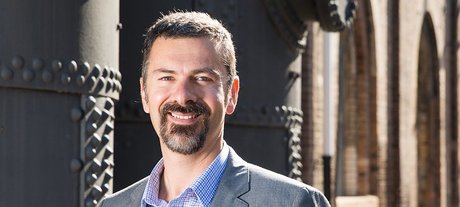Innovation the key to success

Australia risks being left behind as the world economy moves beyond products and into data.
In general, aiming to capture 0.01% of a market isn’t seen as an ambitious objective. But when the market in question — global R&D spending — is worth $1.6 trillion, it’s an audacious goal.
As CEO of CSIRO’s newly formed Data61, I want to harness the Australian talent for innovation and make the country attractive to major corporates as a global hub for research and development. I want Data61 to be a resource where corporations and businesses worldwide can turn to, and Australia to be at the centre of a global R&D network.
Many major corporations have a presence in Australia, but this country is generally seen as the ‘sales and marketing subsidiary’, with innovation taking place elsewhere. Instead, Australia should be viewed as a venue for primary R&D. We have an exemplary record for research, but historically we have been poor at getting those developments out to the marketplace.
The World Intellectual Property Organisation ranks Australia 17th in the world overall in its 2015 report, but 38th for its collaboration with researchers and 39th for knowledge and technology output. In general, Australian businesspeople tend not to be research-oriented. Even some of our large, successful home-grown tech companies go offshore to access product management expertise. This needs to change, and the sooner the better.
With the economic focus shifting, the time is right for a similar change in attitudes and approaches. The world is rapidly moving towards data-driven businesses. This is a big change, which could have a $10 to $20 trillion GDP impact on global GDP over the next decade. It touches every sector of the economy.
A big challenge for Australia is that the businesses arising from this shift are taking on different economic structures. We are seeing a move from products to platforms — where a large part of the value of a product is created outside the business. The Internet of Things is going to drive the development of new platforms. As devices start to communicate, the network effect — where each new user of a product makes its value higher — kicks in, as it did with the telephone. The more people connected to the telephone network, the more valuable it became to all of them. Once there was a critical mass of connections, the telephone became a platform for new businesses its inventor never imagined.
Over the next 15–20 years, the same thing will happen across many industries, such as agriculture, mining, transportation, logistics and health care. These emerging platform businesses will scale exponentially, and have naturally monopolistic tendencies due to data feedback loops. Australia needs to be building these platforms, rather than simply participating in them. If we don’t work out how to build new technology-based industries, we are going to be left behind by the digital disruption, as the economy moves beyond products and into data.
To take advantage of this seismic shift in the global economy, Data61 has created the D61+ Partner Program. This is an Applied Research Network aimed at bringing together the best minds to take advantage of data-driven disruption. The platform is predominantly for Australia but has a global context — in several ways. We’re aiming to foster Australian innovation that will be marketed globally. We want to link start-ups to the right people and help them create new technology industries. The platform is also predicated on the idea that instead of competing for a finite and relatively small domestic market, Australian innovators and enterprises need to network and cooperate to take their share of a much larger prize — the global market.
This market works both ways. Smaller companies are finding it difficult to compete against corporate headliners such as Google and Tesla to hire the data talents they need. One of the D61+ Partner Program’s aims is to enable these companies to tap into the minds, ideas and skills of top-tier scientists and technologists without having to vie with the likes of Google for permanent world-class talent. For example, we have one of the world’s top five machine learning teams, so partners will be able to pick the brains of some of the very best people in a rapidly growing field.
Until now, Australia has also lacked the infrastructure that supports entrepreneurs in going out and building new business. That puts us at a disadvantage compared with places like Silicon Valley. Over decades they developed the infrastructure, the workforce, the legal underpinnings and the access to capital. Growing organically over decades, they now stack the odds in favour of entrepreneurs. In Australia, we are having to create these conditions deliberately.
With the D61+ Partner Program, we are working with four key categories of partners: corporates (including SMEs), start-ups (via incubators), government (federal and state) and universities (via a collaboration agreement currently in place). Closer collaboration with these partners will drive leverage and alignment, as well as accelerated time to scale for Australian businesses — with global context. We will also be creating the porous network of talent Australia needs to build new technology-based industries with a global impact.
We’ll be turning the organisation inside out at our new D61+LIVE event on 30 March, exposing our working programs and capability, making it easy for entrepreneurs to do business and engage. At the moment, Data61 is working closely with 31 government partners, 91 corporate partners and 29 partner universities. We’re looking for more partners to join us in this journey, so I hope to meet you at our event in March.
Big AI in big business: three pillars of risk
Preparation for AI starts with asking the right questions.
Making sure your conversational AI measures up
Measuring the quality of an AI bot and improving on it incrementally is key to helping businesses...
Digital experience is the new boardroom metric
Business leaders are demanding total IT-business alignment as digital experience becomes a key...







